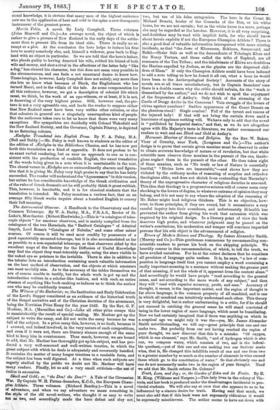Errors of Modern Science and Theology. By James Alexander Smith.
(Murray and Co.)—This gentleman commences by recommending non- scientific readers to peruse his book on the skipping principle. We heartily concur in this recommendation, of which, to tell the truth, we have availed ourselves. For he at the outset declares that he considers all precision of language quite useless. It is, he says, "a law of com- position in language itself that you cannot employ a word containing a really important meaning in a sentence without making the greater part of that meaning, if not the whole of it, apparent from the context alone." And accordingly he would have people "read according to the general sense, and not according to the mere words of any subject," and then they will " read with superior accuracy, profit, and ease." Accuracy of thought, it seems, is the important matter, and the region of thought is far above language, is the common property of all mankind, and is one in which all mankind can intuitively understand each other. This theory is very delightful, but is rather embarrassing to a critic, for if he should not succeed in catching the general sense he will stand convicted of being in the lower region of mere language, which must be humiliating. Now we had certainly imagined that if there was anything on which in a sceptical age we might rely it was the—yes, Mr. James Alexander Smith notwithstanding, we will say—great principle that one and one make two. But probably from our not having reached the region of pure thought, we now discover that this is a mistake. "Of oxygen, which is one element," says Mr. Smith, "and of hydrogen which is also
one, we compose water, which consists of two, and is the inflexi- ble quotient,—yet of this one and one making two our Saviour made wine, that is, He changed this infallible result of one and one from two to a greater number by so much as the number of elements in wine exceed those which go to the constitution of water." So that obviously one and one do not necessarily make two in the region of pure thought. Need we add that Mr. Smith refutes Dr. Coleus° ?
































 Previous page
Previous page